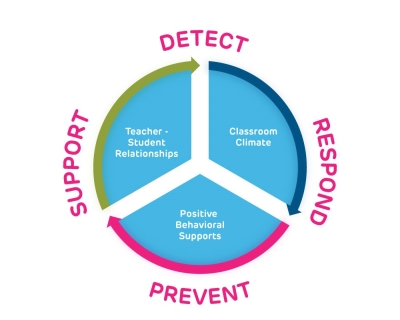Bullying Classroom Check-Up
Bullying Classroom Check-Up (BCCU) is a teacher-consultation program that coaches elementary school teachers to leverage evidence-based classroom management strategies, trauma-informed instructional practice, social-emotional learning skills, and positive behavior interventions and supports (PBIS) approaches to detect, prevent, and respond to bullying and aggression.
BCCU was initially developed in partnership with teachers and students drawn from diverse, under-resourced schools in Maryland in collaboration with researchers at Johns Hopkins University, Bloomberg School of Public Health, and the University of Virginia School of Education. In 2021, the program was brought to Philadelphia schools by Principal Investigators at CVP.
BCCU helps teachers to (1) Develop foundational classroom management skills that integrate social-behavioral expectations, (2) Identify aggressive and bullying behaviors in the classroom, and (3) Select and implement strategies to intervene with aggressive and bullying behaviors briefly and in real-time to create a positive social environment conducive for learning.
Program Details
- How BCCU Works
There are three evidence-based components to BCCU:
- Professional development (PD) modules focus on building concrete knowledge and common language about bullying prevention constructs and teaching skills for bullying detection, prevention, and intervention.
- Coaching through the Classroom Check-Up (CCU) is a classroom coaching model that supports teachers in classroom management (Reinke et al., 2008). The CCU was adapted to include the bullying content throughout the program and in the mixed-reality training experience. For the Bullying CCU (BCCU), coaching is driven by data collected during classroom visits by the CHOP Coach, teacher reflections on classroom climate, and a teacher interview guided by motivational interviewing techniques that empower teachers and build their sense of efficacy for implementing new practices in their classroom. With this information, teachers identify their own bullying prevention goals, for which they receive ongoing feedback, coaching, and guided practice opportunities (in the mixed reality simulator described below) from CHOP.
- The TeachLivE© Simulator is an immersive, mixed-reality (i.e., part real, part synthetic) training experience in which the teacher sees and communicates with student avatars through video conferencing technology. Given the unpredictable yet harmful nature of bullying behaviors, it provides teachers with guided practice of new skills before they try to implement those skills with students in their classroom.
These three BCCU components help prepare teachers to better address problematic peer interactions and reduce the occurrence of bullying in schools.
- Evidence-base for BCCU
With support from the National Institute of Justice, the BCCU was developed and preliminarily tested. Findings from a 78-teacher-randomized controlled pilot trial in five middle schools demonstrated that the BCCU’s bullying prevention support for teachers yielded benefits across a range of teacher-reported outcomes, including increased referrals to school counselors, intervening with bullying perpetrators and victims and perceptions that school staff need to better address bullying.
- Current Research
The National Institute of Child Health and Human Development (NICHD) / National Institutes of Health (NIH) is funding an efficacy trial of the BCCU to determine its effectiveness in elementary schools, where students often spend their day with one influential teacher and assess BCCU’s potential to have a systemic impact on bullying and prosocial behaviors. Researchers and staff from CHOP and Johns Hopkins University, Bloomberg School of Public Health will run the program and lead data collection.
Recommended Resources
- Relevant Publications
- Waasdorp TE, Mehari KR, Bradshaw CP. Anti-Bullying Programs in the U.S.A. and Canada. In P. K. Smith & J. O’Higgins (Eds.), Bullying Handbook. Oxford: Wiley-Blackwell. 2019.
- Pas ET, Waasdorp TE, Bradshaw CP. Coaching Teachers to Detect, Prevent, and Respond to Bullying Using Mixed-reality Simulation: An Efficacy Study in Middle Schools. International Journal of Bullying Prevention, 2019.1;58-69.
- Bradshaw CP, Waasdorp TE. Preventing Bullying in Schools: A Social and Emotional Learning Approach to Prevention and Early Intervention. New York: Norton Publishing. 2019.
- Relevant Reading
- "Bullying Prevention Support for Teachers" -- March 15, 2022
- "Training Teachers to Detect, Prevent, and Intervene with Bullying" -- March 11, 2022
- “Coaching Teachers in Detection and Intervention Related to Bullying” -- March 2019
- “Empowering Schools to Change Behavior and Attitudes” -- May 5, 2020
- “Flipping the Switch: How Technology Can Help to Prevent and Address Bullying” -- November 14, 2018





